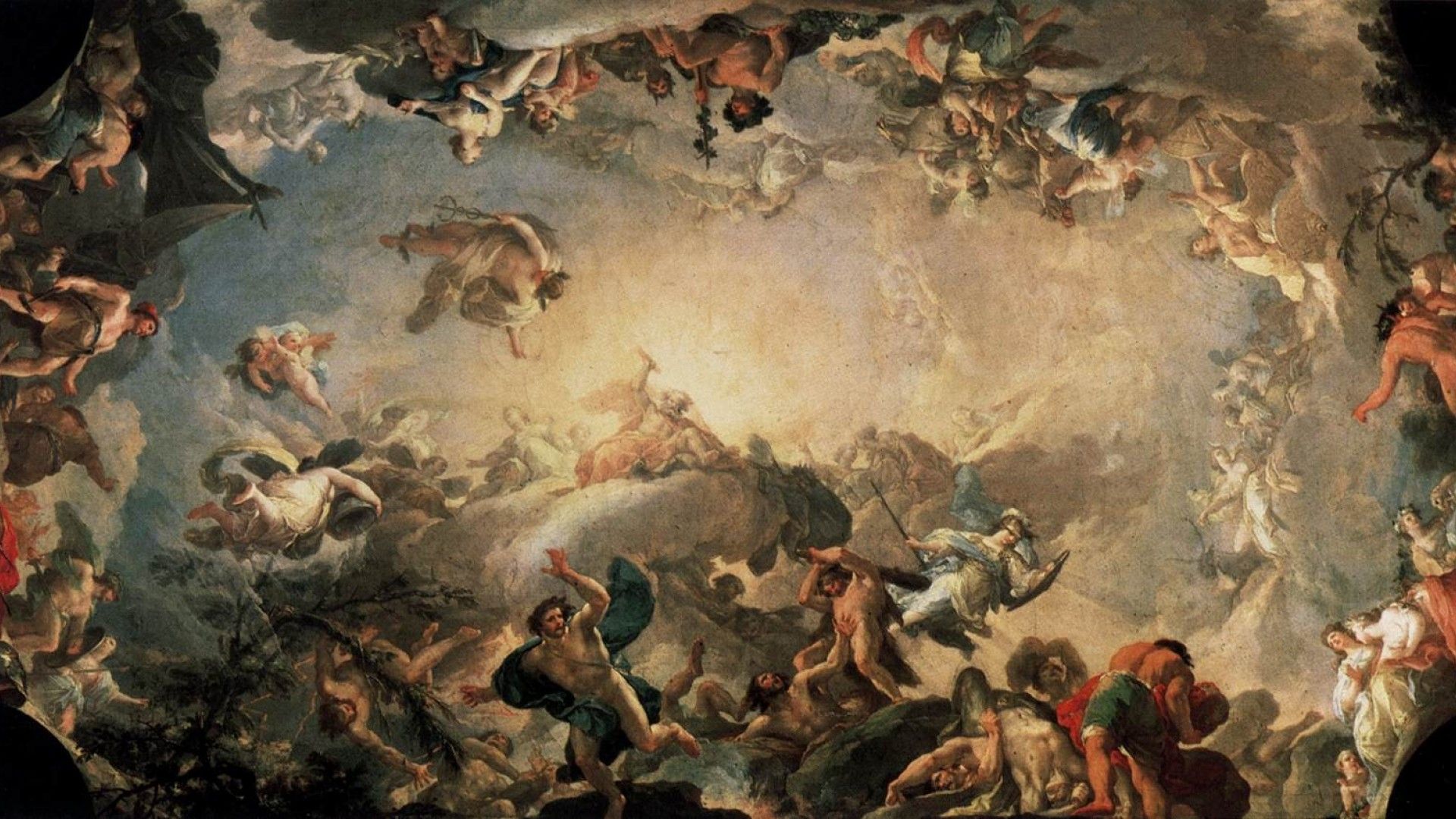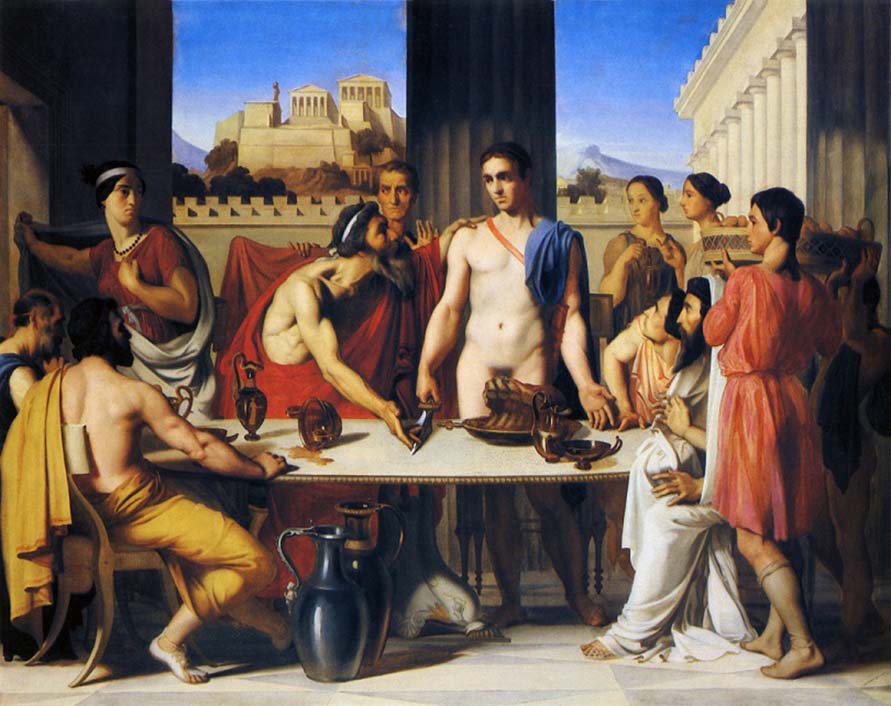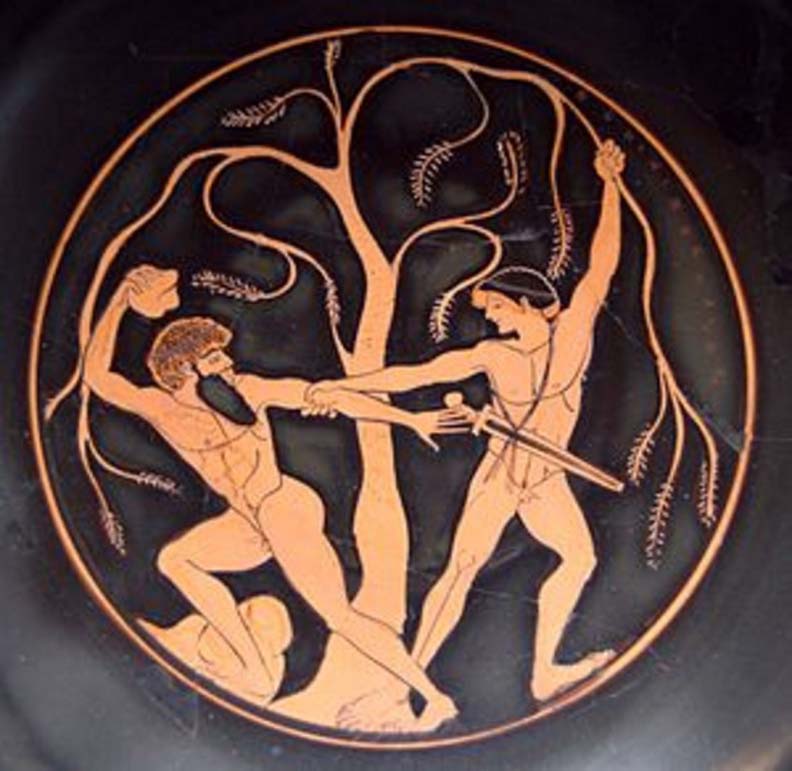
Pittheus

In Greek mythology, Pittheus (Ancient Greek: Πιτθεύς) was the king of Troezen, city in Argolis, which he had named after his brother Troezen.
Mythology
Family and Character
Pittheus was a son of Pelops and Dia (maybe another name for Hippodamia), father of Aethra and Henioche, and grandfather and instructor of Theseus.
Pittheus would have many siblings, for Pelops may have had in excess of 20 children, including famous brothers, Atreus and Thyestes, and famous sisters, Astydameia and Eurydice. The sons of Pelops were known for creating new city states, ad Pittheus was no exception.
He was described by Euripides as the most pious son of Pelops, a wise man, and well versed on understanding the oracle thus sought by Aegeus. Pittheus is said to have taught the art of speaking, and even to have written a book upon it. Plutarch spoke of Pittheus' account in the following verses:
"[Pittheus] had the highest repute as a man versed in the lore of his times and of the greatest wisdom. Now the wisdom of that day had some such form and force as that for which Hesiod was famous, especially in the sententious maxims of his 'Works and Days'.
One of these maxims is ascribed to Pittheus, namely: — 'Payment pledged to a man who is dear must be ample and certain.' At any rate, this is what Aristotle the philosopher says, and Euripides, when he has Hippolytus addressed as 'nursling of the pure and holy Pittheus,' shows what the world thought of Pittheus."
(Plutarch. Life of Theseus, 3.1)
The story of Troezen
Pelops was the strongest of the kings in Peloponnesus quite as much on account of the number of his children as the amount of his wealth. He gave many daughters in marriage to men of the highest rank, and scattered many sons among the cities as their rulers.
Coming from the district of Pisatis in Elis, Pittheus and his brother Troezen were received by Aetius, son of Anthas. This Anthas was a brother of Hyperenor and the two were sons of Poseidon and Pleiad Alcyone, both reigned in Hyperea and Anthea before Aetius.
The Pelopids settled in the country and divided the power with Aetius. Thus, after these events the land was ruled by three kings instead of one: Aetius, Troezen and Pittheus but the newcomers enjoyed the real authority.
This was evident after Troezen's death for Pittheus who supplanted the earlier dynasty, ruled as the sole king. Having gathered settlers together and joining the two villages of Hyperea and Anthea into a modern city, Pittheus renamed it Troezen after his sibling.
Bellerophon came to Troezen to ask Pittheus for Aethra's hand in marriage, but the hero was banished from Corinth before the nuptials took place.
Aegeus' coming
Pittheus was a highly regarded king, considered learned and wise. Pittheus was also the father of two daughters, by an unknown woman, or women. These daughters of Pittheus were Aethra and Henioche.
During the time of Pittheus, King Aegeus of Athens came to Troezen seeking a deciphering of an Oracle’s prophecy about whether Aegeus would have any sons, the words given by the Pythia of Delphi being, “Loose not the wine-skin's jutting neck, great chief of the people, Until thou shalt have come once more to the city of Athens”
Pittheus took advantage of the situation, and getting Aegeus drunk, he had the king of Athens lie with his daughter, Aethra. It was also said that Poseidon also lay with Aethra that day.
Aegeus would travel on to Athens, leaving behind his sandals, shield and sword, in case Aethra gave birth to a son for the king. Aethra of course did give birth to a son, a boy who would be called Theseus, Pittheus’ grandson.
On another account, the story goes as follows: Pittheus understanding the oracle on Aegeus' inquiry whether or not he was going to ever have children, had made the Athenian king drunk, who ended up spending the night with his daughter Aethra. Aethra had lain with Poseidon earlier that evening, so when Theseus was born he became Aegeus' stepson.
According to Plutarch (Plutarch. Theseus, 6.1), Pittheus merely spread the report of her daughter's copulation with the god so that Theseus might be regarded as the son of Poseidon, who was much revered at Troezen.
Two heroes
A Troezenian legend of the earliest notable event of Theseus' life is set in the house of Pittheus. After he had finished his labours, Heracles came to visit Pittheus. He laid his lion-skin down on a couch where it sat in a most lifelike fashion.
A little while later Theseus, who was seven years old at this time, came into the room with some of his schoolmates. When the other children saw the skin of the Nemean lion, they ran from it in terror, thinking that it was alive. However, Theseus remained in the room, grabbed an axe from a nearby guard, and attacked the lion-skin.
When Heracles became slave of Omphale in Lydia, villains burst forth and broke in the regions of Hellas because no one would rebuke and restrain them.
The journey was therefore a perilous one for travelers by land from Peloponnesus to Athens, and Pittheus, by describing each of the miscreants at length, what sort of a monster he was, and what deeds he wrought upon strangers, tried to persuade Theseus to make his journey by sea. But the hero, secretly inspired by the valor of his cousin Heracles, paid no heed of his grandfather's warnings, traveled by the road and eventually cleared it from brigands and bandits that infested it.
The story of Hippolytus
Pittheus would become mentor to Theseus, passing on his knowledge and skills to his grandson, and thus when of age, Theseus was ready to take up the mantle of heir to the throne of Athens. Pittheus would later take up the role of mentor to Theseus’ son, Hippolytus, who was sent to Troezen by Theseus, after Theseus had taken a new wife in Phaedra.
Pittheus would again pass on all his knowledge, with the expectation that Hippolytus, nominally Pittheus’ great-grandson, would become ruler of Troezen. This though did not come to pass because Hippolytus died after the intrigue of his stepmother, Phaedra, who accused her stepson of rape, resulting in Theseus cursing his own son.
Details of Pittheus’ own demise are not recorded, although in antiquity, it was said that his tomb could be visited in Troezen. Specifically, Pittheus' tomb and the chair on which he had sat in judgment were shown at Troezene down to a late time (Pausanias. Description of Greece, 2.31.3).

Sources
Pausanias, Description of Greece, 2.30.9
Scholia. ad Pindar. Olympian Ode, 1.144
Euripides. Heracleidae, 207; Dictys Cretensis. Journal of the Trojan War, 5.13; Athenaeus. Deipnosophists, 13.4; Hyginus. Fabulae, 14.2, 37, 79 & 243 Isocrates. Helen, 10.8 (Commentary, s.v. Theseus); Sir Richard C. Jebb, Commentary on Sophocles: Oedipus at Colonus 562
Diodorus Siculus. Bibliotheca Historica, Book 4.59.1
Plutarch. Life of Theseus, 25.4
Euripides. Medea, 683; Plutarch. Life of Theseus, 3.4
Pausanias. Description of Greece, 2.31.3
Plutarch. Life of Theseus, 3.1-2 This article incorporates text from this source, which is in the public domain.
Plutarch. Life of Theseus, 3.1 This article incorporates text from this source, which is in the public domain.
Strabo. Geography, 8.6.14
Pausanias. Description of Greece. 2.30.8-9; William Smith. Dictionary of Greek and Roman Geography. s.v. Troezen
Pausanias. Description of Greece, 2.31.12
Plutarch. Life of Theseus, 3.3 This article incorporates text from this source, which is in the public domain.
Pseudo-Apollodorus. Bibliotheca, 3. 15. 7; Bacchylides. Dithyrambs, 3.34
Plutarch. Theseus, 6.1
Pausanias, Description of Greece, 1. 27. 7
Plutarch. Theseus, 6.5-6
Pausanias. Description of Greece, 1.22.2; Euripides. Hippolytus, 11; Diodorus Siculus.
Pausanias. Description of Greece, 2.31.3
"Wikipedia"
Our Mobile Application
Check out Our Mobile Application "Ancient Greece Reloaded"


